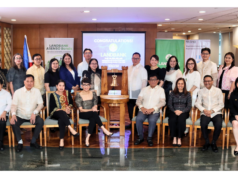SCIENCE CITY OF MUÑ0Z – More and more students are now attracted to agriculture course, a sharp contrast to what happened before, an official of the Association of Colleges of Agriculture of the Philippines (ACAP) reported.
Dr. Federico Perez, ACAP executive director, said that most of the deans of colleges of agriculture in the country who attended a recent convention here noted that many new entrants in higher education have become attracted to the Bachelor of Science in Agriculture (BSA).
The convention was held at the Central Luzon State University (CLSU) here last week of May.
Perez, who is dean of the CLSU College of Agriculture, said that the implementation of what is termed as “super BSA program” ordered implemented by the Commission on Higher Education (CHED) was agreed as a big come-on for the students.
He explained that the program, as crafted by CHED, was aimed at producing graduates who have general competencies in carrying out the science, art, ethics, management and entrepreneurial business in the production, processing, and marketing of plants, animals and other organisms utilized for food, fiber, recreation, biomedicine, industrial and other purposes.
“It’s actually a two-in-one agriculture program that we are implementing as the students are given a certificate after completing two years of the course,” Perez said.
“Then they continue on completing the bridging program until they master the 14 duties and responsibilities of an agriculturist,” he added.
Perez also said that the students in the BSA program are required to undertake “practicum” in order to expose them to actual conditions and gain practical experiences.
“They will engage in their selected projects in agriculture and in the process earn for the products of their endeavor,” he said.
The rationalized and ladderized BSA program, Perez said, was launched by CHED in 2008 initially for colleges of agriculture who were ready to implement it with the others given three years preparation to implement it.
CHED, according to the ACAP official, decided to overhaul the BSA program when it noted a decreasing trend in enrolment in this course in the country in favor of health science and technological courses.
One reason given was the limited employment opportunities of BSA graduates who were trained under a highly specialized old curriculum.
The revised course is expected to turn out globally competitive agriculture graduates.
Perez said fund assistance to colleges of agriculture and scholarships offered by many sectors for agriculture students, that include legislators, augured well for the BSA program.
He said his college which was selected as center of excellence for agriculture has been receiving assistance of P3 million a year for three years and another P1 million under the National University College of Agriculture (NUCA) selection.
“We are using the funds for the improvement of our facilities for bigger opportunities of students to apply the knowledge learned inside the classroom,” Perez said.
He said the enrolment now in his college, which was one of the first in the country to implement the new BSA program, is more than 1,200 which was double the enrolment five years ago.
Perez has been showing visitors his entrepreneurship center wherein his agriculture students are carrying out ventures in agriculture-related activities.
He said the students earn while they learn in the ventures that they had put up.




